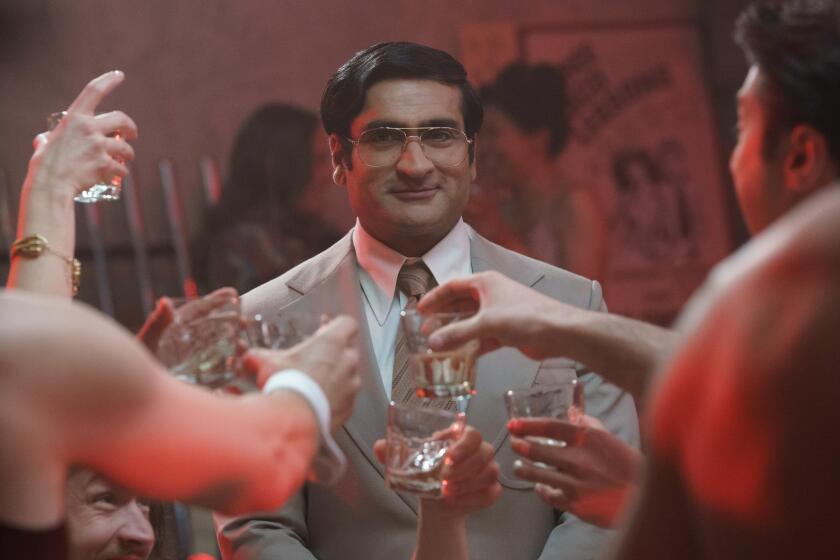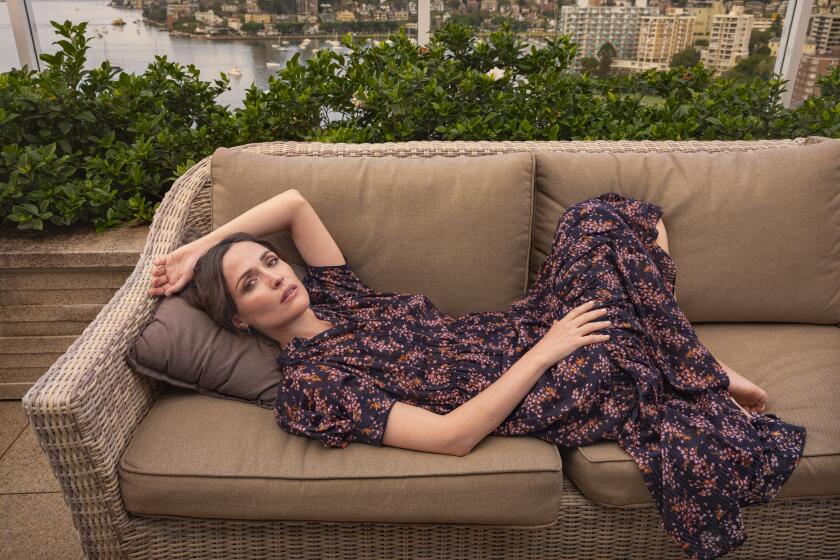Acting once left Murray Bartlett ‘in pieces.’ How he became Hollywood’s go-to ‘hunk’
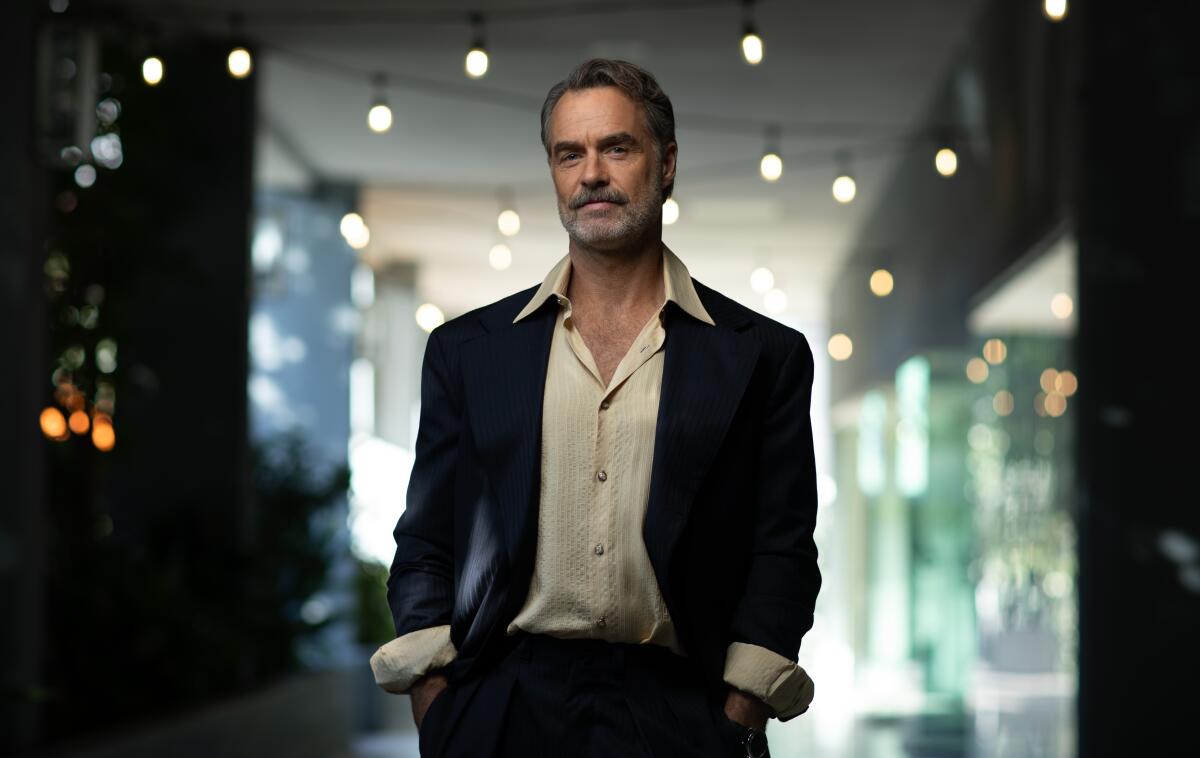
- Share via
BROOKLYN — If there’s a lesson to be gleaned from the arc of Murray Bartlett’s career, it may be this: Never underestimate the power of a really great mustache.
A decade ago, the actor was grappling with professional doubts after a stint as a series regular on “Guiding Light” and a flurry of one-off parts in shows like “White Collar.” Feeling restless, he decided to spend a few months in Cairo with his then-partner, who is Egyptian, during the height of the Arab Spring, and grew a mustache to fit in better with the locals.
Out of the blue, he got an audition for an HBO series about a circle of gay friends living in San Francisco called “Looking.” He put himself on tape from Cairo and landed the part of Dom, a sexually magnetic waiter with a retro Tom Selleck ’stache. The quietly groundbreaking series, never a major hit, was “one of the first times where I realized that work could be like pure joy,” says Bartlett on a sunny fall afternoon at Diner, a culinary mainstay in the shadow of the Williamsburg Bridge that he frequented during nearly two decades as a Brooklynite. “I like to think they liked other aspects of the audition, but the mustache was pretty pivotal in getting that role.”
Kumail Nanjiani and the rest of the all-star cast bring human dimension to Hulu’s true crime tale about the founding of the male stripper empire.
As the J train rumbles overhead, Bartlett explains the deeper meaning of his facial-hair journey: “In these periods of doubt, I’ve usually stepped away. Often, I’ll go traveling or do something different. And somehow it sort of brings me back, like it did there, where I was like, ‘You’re an idiot. You’re doing what you love, and you’re lucky to do it. So shut up.’ And somehow, it directed me to the next thing.”
Mike White was similarly charmed by Bartlett’s mustache when he was looking for the right person to play Armond, the beleaguered hotel manager whose spectacular unraveling fuels Season 1 of “The White Lotus.” (White ordered him not to shave it before filming began in late 2020.) The project came along during the height of the pandemic. Bartlett, who had recently relocated to Provincetown, Mass., from Brooklyn, assumed he wasn’t going to work for a long time.
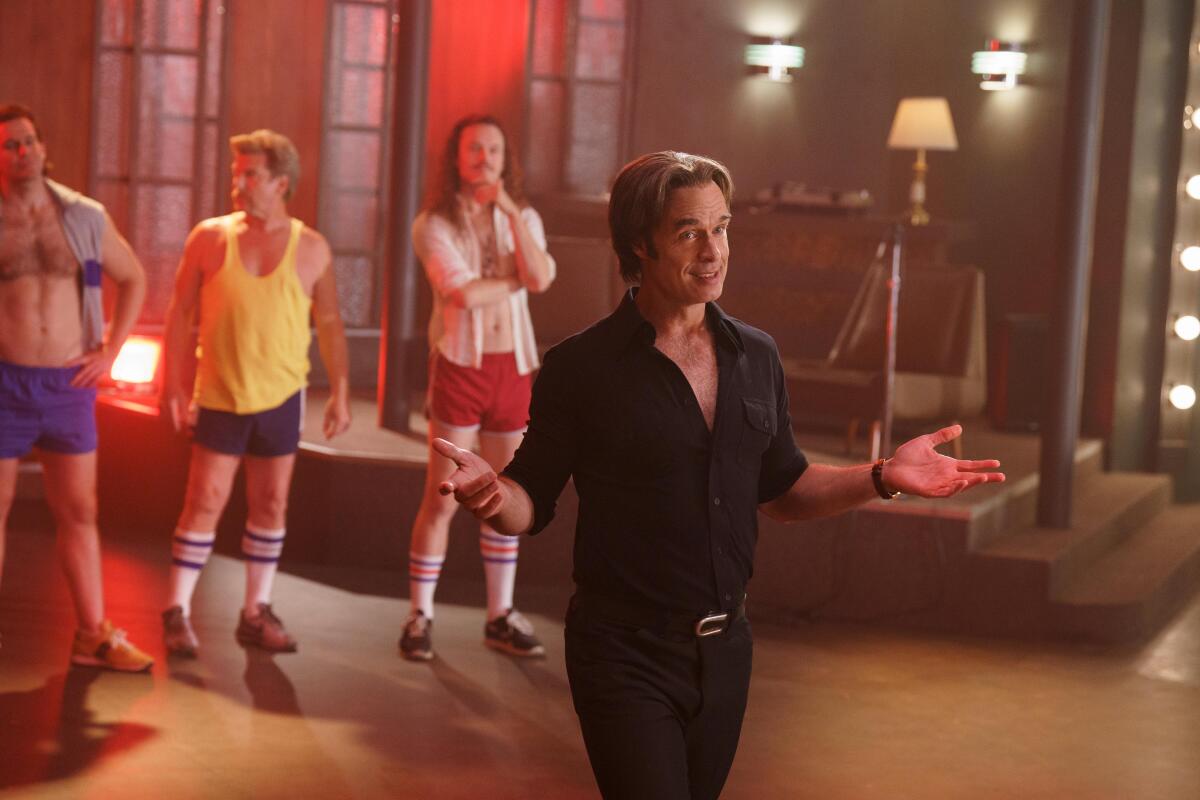
Instead, he won an Emmy for his hilarious, heartbreaking turn, and is enjoying a career renaissance after decades on the cusp. He followed “The White Lotus” with a recurring role in the fitness-world dramedy “Physical,” opposite fellow Aussie Rose Byrne, earlier this year. Next month, he’ll appear in “The Last of Us,” a postapocalyptic video game adaptation from “Chernobyl” creator Craig Mazin.
And he’s currently flexing his tragicomic muscles in “Welcome to Chippendales,” a Hulu limited series based on the surprisingly ill-starred history of the male strip revue that became a cultural sensation in the 1980s. Sporting not a mustache but a glorious cape of hair, he plays Nick De Noia, the visionary choreographer and filmmaker who shaped the Chippendales’ buff-guys-in-bow-ties aesthetic and was killed in 1987 amid tensions with the company’s founder, Steve Banerjee (played in the series by Kumail Nanjiani). It’s yet another flamboyant character Bartlett infuses with unexpected depth and subtlety.
“Suddenly, I have a lot of work and a lot of choices,” says the actor, 51, who is currently in New Jersey working nights on an indie film called “Ponyboi,” for which he’s grown an impressive silver beard that makes him look like an L.L. Bean model. “To be in a position where I can ask questions and think more deeply about what I want to put out in the world and then be able to make choices based on that. It’s just such a beautiful thing.”
Writer-director Mike White and his cast reveal how HBO’s limited series unearthed the ‘apocalyptic anxiety’ beneath the surface of luxury tourism.
Growing up in Perth, Western Australia, Bartlett discovered a love for performing by accident — literally. When he was very young, he lost most of his teeth in two separate incidents a few months apart. (One involved his brother and a hammer; the other some enthusiastic blanket-twirling and a concrete floor.) By the time his adult teeth grew in some years later, he couldn’t pronounce the letter S, so he started speech therapy, and found that he loved reciting poems and monologues.
Though his parents divorced when he was young, Bartlett was, and is, very close to his mother, “an extraordinary person” who worked in local politics and social justice causes. Bartlett never really had to come out: When he was about 14, his mother asked him if he thought he might be gay. “Yeah, I think so,” he recalls saying. Though it was the 1980s — “a weird, tragic, bizarre time to be realizing you’re a queer person” — he felt unconditionally loved and supported by his immediate family.
After attending performing arts high school, Bartlett enrolled at the prestigious National Institute of Dramatic Art in Sydney; he says he chose it because Judy Davis went there. His contemporaries included Cate Blanchett and Toni Collette, performers who thrived while still in school. Bartlett, who describes his younger self as “super sensitive,” had a harder time. “The idea [at NIDA] was to break you down and pick you apart and then reassemble you,” he says, “but I never felt that I was reassembled — just, like, left in pieces.”
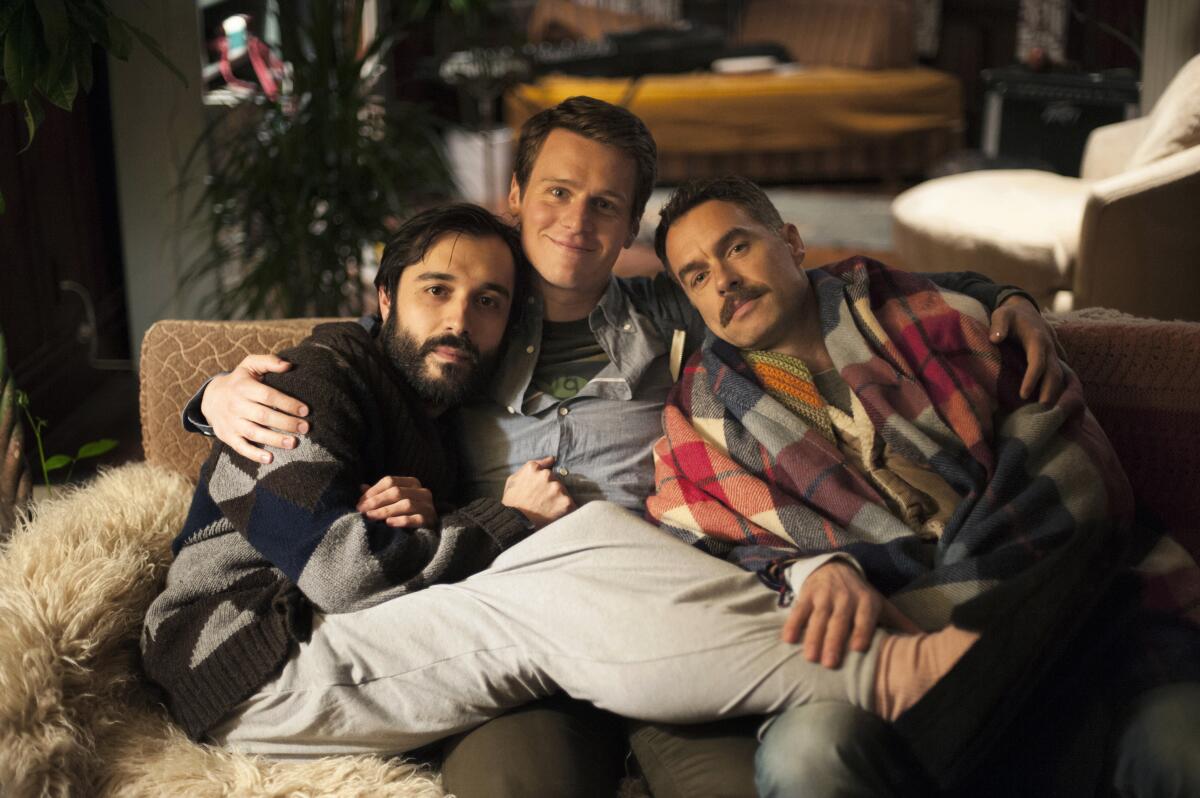
Though he worked steadily in theater, film and TV — including the popular Aussie soaps “Neighbours” and “Home and Away” — Bartlett felt opportunities at home were limited and, in his late 20s, started over in New York. He took classes at the Atlantic Theater Company and worked at the Slide, a gay bar in the East Village, reveling in the downtown scene. “I felt really free to reinvent myself,” he says of this period.
In an early turning point, he starred in a (very) 2002 episode of “Sex and the City” as a handsome shoe distributor who takes Carrie Bradshaw to Bungalow 8 and explains the “international gay rules” over brunch. The performance helped him score an agent and earned him recognition from strangers for years to come.
Bartlett later became a regular on “Guiding Light,” playing a jewel thief named Cyrus Foley. Though he sometimes worried that other actors would look down on him for doing soaps, Bartlett came to see it as a valuable experience — a steady paycheck and daily practice memorizing dialogue and hitting marks. “You learn so much just from working,” he says, “and that’s something there’s a great deficit of for most actors.”
“Looking,” which premiered in 2014, brought Bartlett the sustained creative fulfillment he’d been missing. “Murray has always said that he just wants to do work that he loves with people he loves, and ‘Looking’ was the proof that that could actually happen,” says his friend and “Looking” co-star Jonathan Groff, one of several actors who responded with an almost-instant “yes” when asked to speak about Bartlett for this story — a rarity.
People just “love the s— out of him,” says Groff, who has helped Bartlett tape many auditions over the years, including once while they were in Australia “in a place without a working toilet.” (Bartlett’s “Physical” co-star Byrne, despite trying to keep it professional and avoid the Australian habit of shortening everyone’s name, slipped and gave him the endearing diminutive “Muzz.”)
“Murray is a very sneaky actor. He’s incredibly honest, real and subtle. And I think that subtlety and naturalism can often be overlooked,” says Groff, remembering the thrill of watching him in “The White Lotus.” “To see someone so gifted getting to have their shot. I could just weep. This is finally happening for Murray. Something is right in the world.”
In 2019, Bartlett and his partner, who is not in the business, relocated to a property outside Provincetown, near miles of woods and untouched coastline — “my fantasy,” he says. The goal was to be closer to nature and build a community with their chosen family.
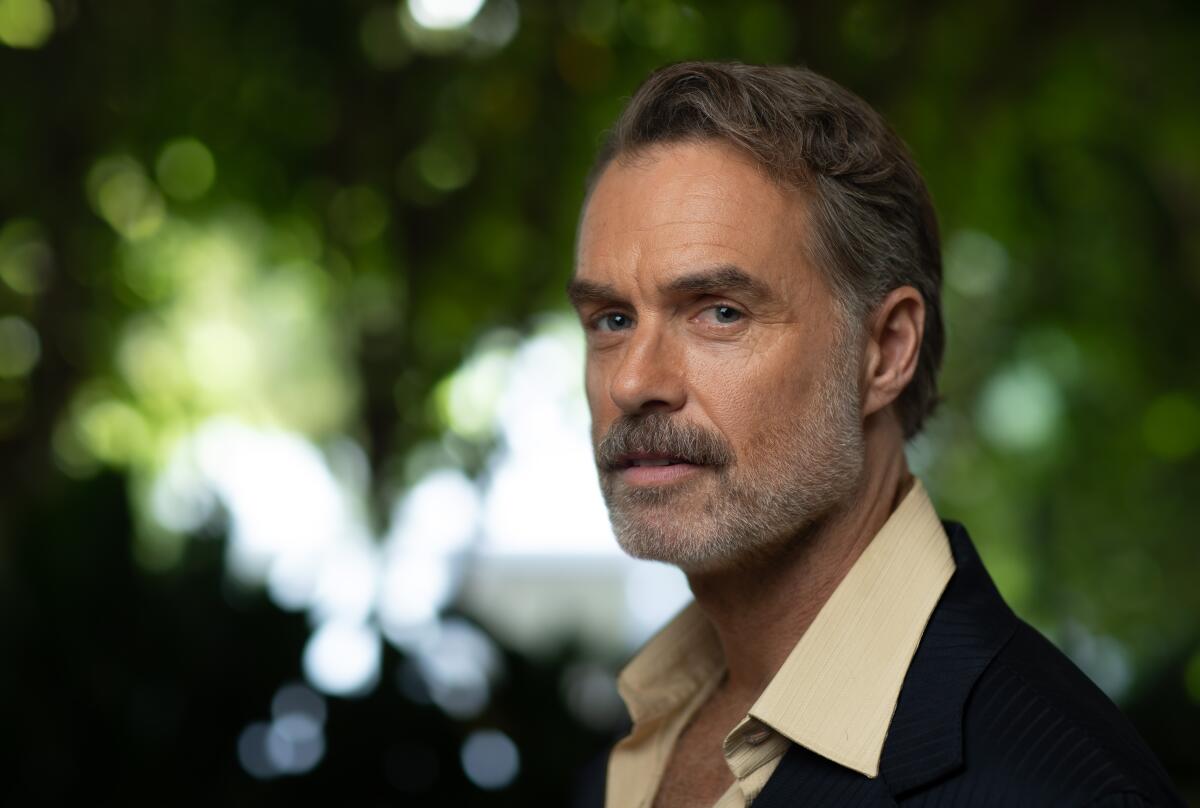
Bartlett worried about having to step away from acting and find a plan B. “Then the pandemic hit, and I got this bizarre job in Hawaii out of nowhere,” he says, referring to “The White Lotus.” “The lesson for me anyway is like, when you make a choice that’s for the greater good of your life, a lot of things open up in a way that you could never imagine.”
White wasn’t familiar with Bartlett before casting him in “The White Lotus” but knew that for the story to work, viewers had to care about Armond, even as he behaved in unconscionable ways. It helped that Bartlett was “obviously attractive,” White says. “The fact that Murray is such a whatever — a hunk, a handsome man. It doesn’t make it right, it just doesn’t make it nauseating.
“Sometimes you take a chance on somebody, and then it just pays off hugely,” White adds.
Bartlett gave not only “a full-throttle comedic performance” but also brought “a deeper dimension to the character than I had even hoped,” says White. “He’s very contemplative. A lot of the cast hung out and got rowdy at night, and Murray is more of an introvert — more shy and reserved. And there’s a melancholy that accompanies that.”
From Crawford to Tony Soprano, Byrne explains the inspirations for her performance as a tormented aerobics instructor in Apple’s new show “Physical.”
Viewers know little about Armond’s backstory, but in a scene that ultimately was cut from the series, he talks about his broken dreams of becoming an actor and getting to play all the parts. “Instead, he has just one part and it sucks — the part of the service person,” says White.
“I fully related to that,” Bartlett says. “I have watched a number of people go that route of wanting to be an actor, particularly in musical theater, then it doesn’t quite work out, and they work on cruise ships.”
As for the series’ much-discussed poop scene, Bartlett remembers “having a really in-depth conversation with the props guy” about the exact combination of chocolate bars used to create the faux feces. “It seems sort of wanky and bizarre to say,” he says, “but as long as there’s a purpose in the scene, I don’t mind s— in a suitcase.”
“Murray is very good at playing people with both his feet on the ground. And that’s something that I think is very underrated,” says Nanjiani, who stars as Chippendales founder Banerjee in “Welcome to Chippendales.” “He is fully grounded in every single moment onscreen,” even in scenes that could veer into camp, as when Nick tells the dancers to move like they’re a tongue licking the wall.
Nanjiani, also an executive producer on “Welcome to Chippendales,” says his wife, writer Emily Gordon, had suggested Bartlett for the role “because we need someone who both men and women want to have sex with, and nobody fits the bill better than Murray.”
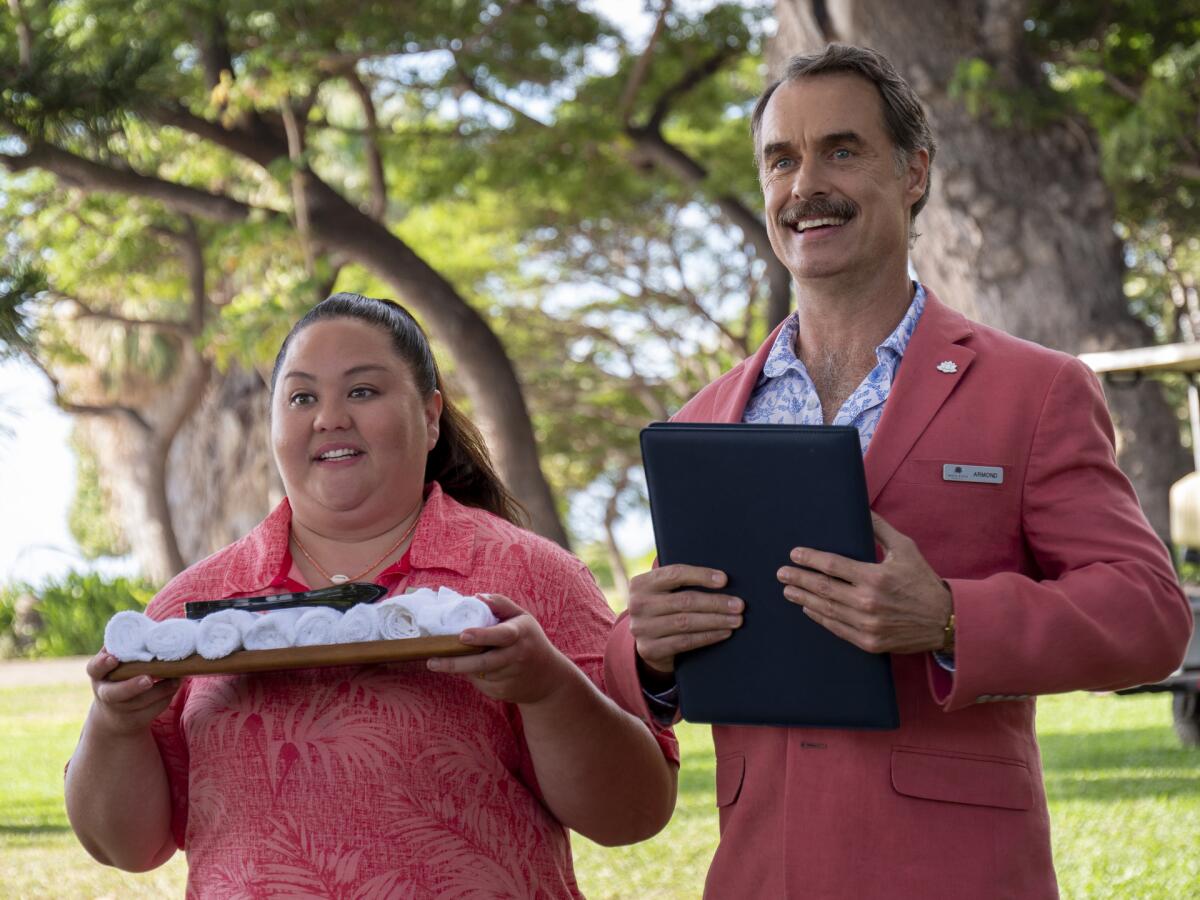
Nanjiani recalls running into Bartlett at the airport after the Emmys and being shocked to learn he checked the award in his luggage. “I would not let that thing out of my sight for years. And he just, like, put it in a bag and gave it to United Airlines.”
He also was impressed by Bartlett’s reverence for his character, a would-be Bob Fosse who’d created an inventive, Emmy-winning children’s show called “Unicorn Tales.” He’d often watch it between takes, and once doubted the authenticity of a story Nanjiani shared about De Noia making kids on the show eat shaving cream. “I think he really fell in love with the real Nick De Noia.”
Bartlett doesn’t go quite that far, but he is effusive in his praise of “Unicorn Tales,” remnants of which are floating around on YouTube. “He was a true visionary. I was just blown away when I saw that stuff. I think it’s so beautiful. He’s sort of like this body that just can’t contain all this creative energy.”
One might say the same of Bartlett, who also has a part in “Extrapolations,” a climate-change anthology series for Apple, next year, and a full slate of travel including a long-delayed trip to see family in Australia.
“I have days of terror and anxiety like the next person,” he says. “But for the most part, I’m just loving every second of it.”
More to Read
The complete guide to home viewing
Get Screen Gab for everything about the TV shows and streaming movies everyone’s talking about.
You may occasionally receive promotional content from the Los Angeles Times.
